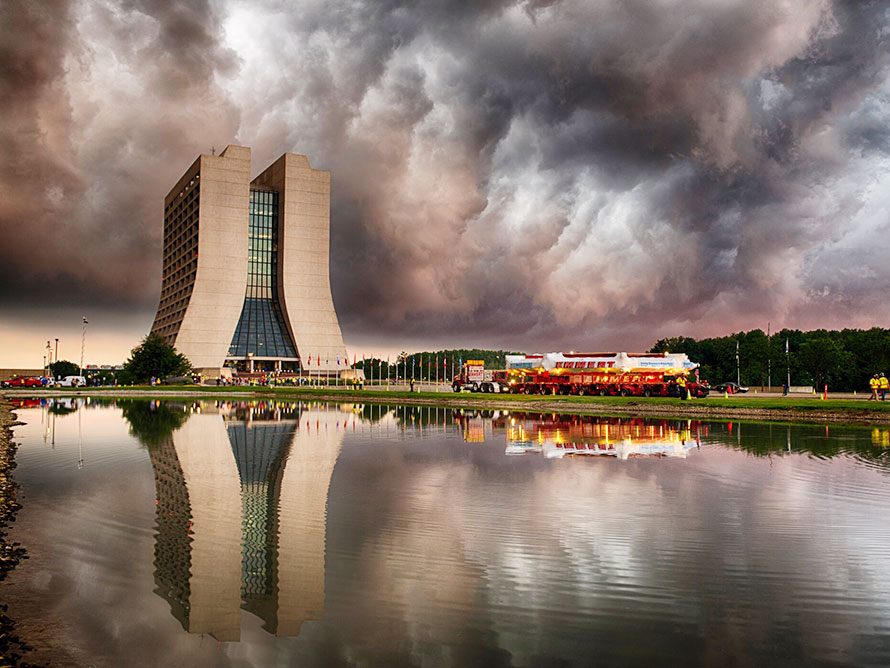Is it exciting to realise how little we really know? Yesterday, the news broke that a misbehaving particle might overturn our current understanding of physics, forces and matter itself. It was just a “tiny wobble.” But it might upend what we thought were the laws of nature. Yesterday, the world learned that scientists outside Chicago made the jaw-dropping discovery that muons — dense, unstable particles of matter nicknamed “fat electrons” — move in a way that defies physics. It could mark the discovery of a fifth fundamental force, one which has previously eluded scientific attention. “It potentially points to a future with new laws of physics, new particles and a new force which we have not seen to date,” said physicist Mark Lancaster. The findings might disrupt our confidence in scientific knowledge. Humanity has untangled climate systems and cloned the cells that make up living things. We have reached the tallest peaks and deepest pits. We have mapped out faraway planets and charted long-dead stars. And yet, for all our efforts, the massive bulk of knowledge remains out of reach. Astronomers believe only 4.9% of the universe is made from normal matter – those atoms that make up everything from houmous, hats and human beings to celestial bodies. We know almost nothing about the remaining 95.1%. “Not only is the universe stranger than we think, it is stranger than we can think,” said pioneering quantum physicist Werner Heisenberg. Naturalists estimate that 82% of animals and plants on Earth are unidentified, plus an untold number of microorganisms. Biologists do not fully understand why we cry, laugh, itch, sleep and dream. Scientists can never be certain. Stephen Hawking nicknamed quantum physics “dreams that stuff is made of.” A scientific discovery is defined as having a one in 3.5 million chance of being a fluke: a slim margin of error, but a chance nonetheless. All of these are known unknowns, flaws in our knowledge that we are aware of. But there might also be myriad unknown unknowns, of which we have no inkling whatsoever. Many find these terrifying. Stable knowledge powers human society. An engineer building a car needs to know its engine will function safely, while a pharmacist must know that a medicine will cure rather than harm a patient. If the laws of nature change, we lose this certainty, with potentially negative side effects. But there is another perspective. A world in which everything is known threatens to be stale and boring. And it is the holes in our knowledge that push us to make new discoveries. The modernist poet Wallace Stevens wrote: “it is the unknown that excites the ardour of scholars, who in the known alone would shrivel up with boredom.” The unknown also fires our imagination. Many of the greatest achievements of human culture, from the Ancient Egyptian pyramids to Hieronymus Bosch’s paintings of heavens and hells, speculate on life after death. And the objects of our imagination can preempt knowledge, and perhaps influence later discoveries. The Czech dramatist Karel Čapek invented the robot in a 1920 play, while American science fiction writer Arthur C Clarke accurately described communications satellites in 1945, 13 years before the first satellite orbited Earth. Long-term speculation about the existence of parallel universes now finds scientific expression in the many-worlds theory of quantum mechanics. Is it exciting to realise how little we really know? Touching the void Undoubtedly, say some. A world unknown opens minds and fuels the imagination. Life is more interesting when we are adrift on a sea of possibility, rather than masters of a measured, proscribed existence. Besides, It is our ignorance that drives us to make discoveries in the first place. The quest for understanding is often more exciting than the knowledge itself. Absolutely not, say others. The unknown can be scary and bewildering, and it is in the interest of our happiness to eliminate as much of it as possible. Human history is a tale of increased knowledge leading to greater security, rights and prosperity. And without a firm awareness of the laws of nature, we cannot guarantee that developments in medicine and technology will work safely. KeywordsElectrons - Negatively charged subatomic particles. They are found in the nucleus of an atom.
Is it exciting to realise how little we really know? Yesterday, the news broke that a misbehaving particle might overturn our current understanding of physics, forces and matter itself.
Touching the void
Keywords
Electrons - Negatively charged subatomic particles. They are found in the nucleus of an atom.
Quantum mechanics - A fundamental theory in physics describing the properties of nature on an atomic scale. Unlike general relativity, which works when applied to large objects, quantum mechanics helps describe the world on a tiny level - at a scale where things can be in several places at once, and measurement can affect reality.
Scientists discover a new force of nature

Glossary
Electrons - Negatively charged subatomic particles. They are found in the nucleus of an atom.
Quantum mechanics - A fundamental theory in physics describing the properties of nature on an atomic scale. Unlike general relativity, which works when applied to large objects, quantum mechanics helps describe the world on a tiny level - at a scale where things can be in several places at once, and measurement can affect reality.
